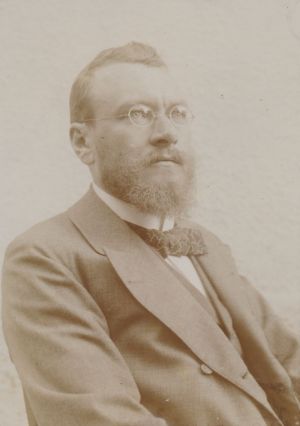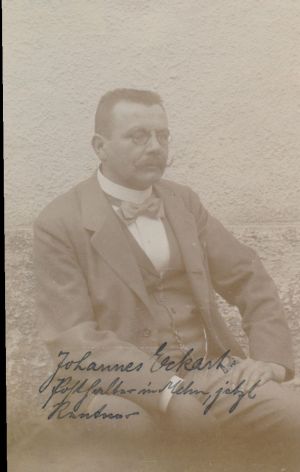The Eckart Family’s Post House

Johannes and Maria Christina Eckart as Founders of the Postmaster Line
The Eckart family’s post house was started in the 18th century by Johannes Eckart, keeper of the inn "Goldener Hirsch" (Golden Deer) and the post house in Emskirchen, Germany. Following the death of the previous postmaster, Johannes Eckart took over the post house affiliated to the inn. He was appointed Imperial Postmaster and was sworn in on Prince Alexander Ferdinand von Thurn und Taxis on February 1, 1758. The postmaster oversaw the administration and accounting of the post house’s postal service. He also had to provide the postal riders and stagecoaches with fresh horses as well as catering for and housing the passengers during their stay. In 1782, Emskirchen’s post house employed a "Beiläufer" (runner), two postal aides and two postal riders. Furthermore, there were 14 horses, a completely closed four-seater carriage as well as two covered and two open barouches.[1] Following his death in 1790, his wife Maria Christina Eckart, née Traugott, continued to run the post house. As public servants, postmasters always had to swear allegiance to the current ruler. In 1807, the Principality of Bayreuth, which included Emskirchen, was attributed to France according to the Treaties of Tilsit. This meant that the postmaster Maria Christina had to swear allegiance to the French emperor Napoleon and became "Imperial-Royal French Postmaster". Three years later, the Kingdom of Bavaria paid 15 million francs to annex the Principality of Bayreuth. Maria Christina was released from allegiance to the French emperor and swore the third oath of allegiance of her postmaster career in 1810. Her new title was "Royal Bavarian Postal Expeditor".[2]
"Napoleon of Emskirchen"
Maria Christina’s son Carl August Eckart continued the postmaster line of the Eckart family. The successful as well as ruthless "Napoleon of Emskirchen" was able to enlarge his property in and around Emskirchen. In 1815, he bought the inn and the post house from his mother. Despite being the richest man in Emskirchen, he refused to pay the agreed purchase price, until his mother hauled him to the court in 1822. As postmaster, Carl August was able to profit from a modernization in transportation during the first years of his professional career. Express carriages for passenger transportation were introduced in Bavaria in the 1820s. They were much more convenient than the old stagecoaches and twice as fast, with a maximum speed of up to ten kilometers per hour. Carl August ran the post house for 31 years, before retiring in 1846. He then transferred the postmaster’s post to his son Gottfried Eckart, who successfully ran the post house and the inn in Emskirchen for another 19 years.[3]
Das Ende der Posthalterlinie in München
Nachdem Gottfried Eckart, der zweitälteste Sohn von Carl August Eckart, 1865 die Posthalterei in Emskirchen wegen der Konkurrenz durch die neue Bahnlinie aufgegeben hatte, zog er zunächst in das benachbarte Neustadt an der Aisch. Hier baute er sich eine neue Existenz als Posthalter auf, bis er 1877 nach München kam. Als bayerischer Landtagsabgeordneter war er zuvor bereits oft in München gewesen. Zum 1. Januar 1877 hatte er den Münchner Poststall für etwa 50.000 Mark erworben. Das alte Poststallgebäude, das einzige in München zu dieser Zeit, lag zwischen der Bayer- und der Schützenstraße. Die Stadtverwaltung ließ das Gebäude allerdings kurz darauf abreißen. Die neue Poststation entstand in einem Anwesen an der Dachauer Straße 27, in direkter Nähe zum Münchner Hauptbahnhof. 3.750 Quadratmeter groß war das Grundstück. Neben der Posthalterei gab es Ställe für die insgesamt 121 Pferde, Wohnungen, Schlafsäle und Essensräume für die 43 Postillione, Wirtschaftsgebäude und ein Verwaltungshaus, in dem die Verwalter und Futtermeister mit ihren Familien wohnten. Die Kutschen und Postwägen fanden Platz auf dem 500 Quadratmeter großen und mit Glas und Wellblech überdachten Einstellplatz im Hof. Gottfrieds Karriere als Münchens Posthalter fand 1880 ein jähes Ende. Vermutlich durch verunreinigtes Wasser erkrankte er an Typhus und starb innerhalb weniger Tage.
Seine Frau Karoline Eckart führte den Poststall weiter. Zur Unterstützung ernannte sie ihre Söhne Carl August und Johannes 1880 und 1882 zu Geschäftsführern. Mit Karolines Tod 1901 wurden die Brüder offiziell königlich bayerische Poststallmeister. Die Münchner Posthalterei war zu diesem Zeitpunkt allerdings unrentabel geworden. Noch im gleichen Jahr verkauften die Brüder den Poststall und kündigten ihren Vertrag als Posthalter. Damit ging nach knapp 150 Jahren die Linie der Eckartschen Posthalter zu Ende.[4]
Einzelnachweise
- ↑ Central archive of the Prince of Thurn und Taxis in Regensburg: Inspection report by the postal service "Thurn und Taxis Post" concerning the post house in Emskirchen 1782, postal files 1512, folio 9 and 10.
- ↑ Eckart, Otto and Kamp, Michael: "Die Geschichte der Familie Eckart. Von Franken nach München und Hawaii" (The History of the Eckart Family. From Franconia to Munich and Hawaii), Munich 2015, pages 95ff.
- ↑ Eckart, Otto and Kamp, Michael: "Die Geschichte der Familie Eckart. Von Franken nach München und Hawaii" (The History of the Eckart Family. From Franconia to Munich and Hawaii), Munich 2015, pages 102ff.
- ↑ Eckart, Otto und Kamp, Michael: Die Geschichte der Familie Eckart. Von Franken nach München und Hawaii, München 2015, S. 163 ff.

